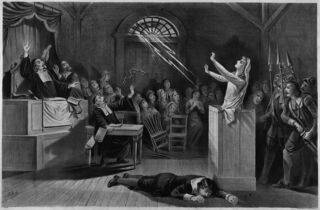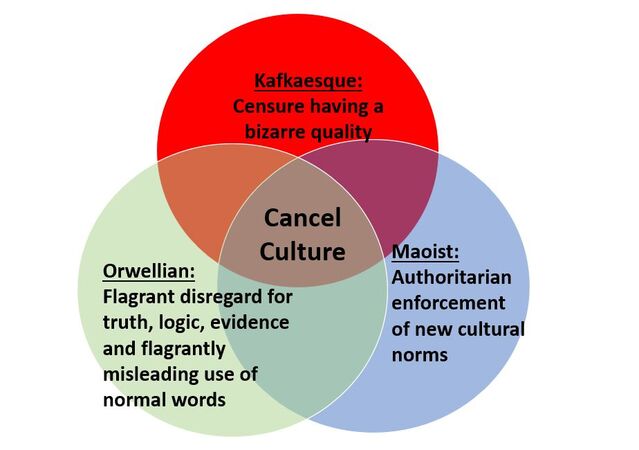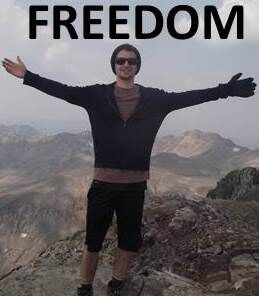Politics
The Rise of a Culture of Censorship
Part 1: Censorship by government and lesser authorities.
Posted March 17, 2021 Reviewed by Gary Drevitch
Censorship generally involves shutting people up, rather than refuting their ideas. This usually takes either of two main forms:
- Deplatforming people, i.e., not permitting them to use a platform to express themselves.
- Some sort of threat of (or actual) punishment for expressing those ideas.
I will be exploring these issues in this three-part series: Censorship by Authorities (this post); Increasing Social Norms of Censorship; and Self-Censorship
What Is Censorship?
Censorship is, according to the Online Dictionary for Library and Information Science, the prohibition of the production, distribution, circulation, or display of a work by a governing authority on grounds that it contains objectionable or dangerous material. To get more specific, let's look at different types of censorship.
Government Censorship
Free speech is, in the grand sweep of history, a mostly recent, and constantly evolving concept.
The ancient Greeks did have a version of free speech, but it was mostly downhill thereafter. On every continent, in just about every culture, far more common than free speech were broadsweeping sedition and libel laws, throwing Christians to lions, witch-burnings, book burnings, blasphemy and heresy laws, Inquisitions and forced conversions. These laws and practices were often "justified" by claims to be doing God's will, keeping society morally pure, preventing filth and corruption, maintaining order, ensuring "respect" for authorities, and/or "protecting" particular social, political, ethnic, cultural, or religious groups.

Because of the First Amendment protections of speech, press, and religion, one might think that the U.S. is a bastion of free speech with only extremely limited government censorship. The truth is more complex. The First Amendment does offer some of the strongest legal protections for speech on the planet. And yet, it is often cultural norms, rather than laws, that offer the strongest protection. For example, before the Civil War, in some Southern states, you could be jailed for publicly calling for emancipation. As late as the 1960s, you could be jailed for protesting against Jim Crow segregation laws in some of those same states. And just this month, the Kentucky state legislature passed a law declaring it a crime to insult the police. The three P's — profanity, pornography, and protest — have long been flashpoints for battles over free speech and censorship. In 2021, countries with some of the strongest laws on the books protecting free speech include N. Korea, Russia, and Turkey.
You are wrong if the only thing you think of, when you think about censorship, is government prohibitions. Most censorship comes from elsewhere. In the U.S., if it is not government censorship, it is not protected by The First Amendment.
Censorship by an Authority Other Than the Government
The definition of censorship provided earlier refers to suppression by a "governing authority." This is an interesting term. It includes, but is not equivalent to "government." There are "governing authorities" everywhere. Your boss is a "governing authority" unless your speech is contractually protected.

Academic journals' editorial boards are the governing authorities over what gets published there. Retraction by outrage mob, of duly published academic articles that have passed peer review, is one manifestation of censorship. (See examples here.) Although outrage mobs usually initiate the process (via pile-ons on Twitter, open letters or petitions, etc.), it is ultimately the editors who make the decision to retract or pressure the authors to "voluntarily" retract. Authorities.
Similarly, Facebook, Twitter, Amazon, GoFundme, Youtube, etc., are the "governing authorities" over what appears on their platforms. The 2021 purge of Qanon and other extreme right-wing accounts from social media constitutes another example of censorship.
Something can be not only available somewhere and still have been censored, it can actually be popular. For example, if you get banned on Twitter, you might still get your ideas out via Facebook, Reddit, or Youtube. In fact, you might become so popular on Youtube or Patreon that you become rich and famous. You still have been censored (by Twitter). This is perfectly legal and does not violate the First Amendment, which only protects people from government interference in free expression.
Depending on the situation, some people might even think they are right for censoring, especially if those censored are posting hateful, racist, or vile content, inciting violent insurrection, or spreading misinformation about public health, election security, or international antisemitic conspiracies. Nonetheless, if you think it is justified, then you think censorship, in this case, is justified. This is important because it contributes to a culture of censorship and self-censorship, raising the question, which is more harmful: To censor dangerous or hateful speech or to create a culture of censorship?
Academic Freedom
Academic freedom is a core constituent of free expression, something given Constitutional protection by the Supreme Court:
"Our Nation is deeply committed to safeguarding academic freedom, which is of transcendent value to all of us and not merely to the teachers concerned. That freedom is therefore a special concern of the First Amendment, which does not tolerate laws that cast a pall of orthodoxy over the classroom.”
From the American Association of University Professors' 1940 statement, which most major colleges and universities claim to endorse:
- Teachers are entitled to full freedom in research and in the publication of the results, subject to the adequate performance of their other academic duties...
- Teachers are entitled to freedom in the classroom in discussing their subject, but they should be careful not to introduce into their teaching controversial matter which has no relation to their subject
From the University of Chicago Statement on Freedom of Expression:
- Education should not be intended to make people comfortable, it is meant to make them think.
- It is not the proper role of the University to attempt to shield individuals from ideas and opinions they find unwelcome, disagreeable, or even deeply offensive.
- The University’s fundamental commitment is to the principle that debate or deliberation may not be suppressed because the ideas put forth are thought by some or even most members of the University community to be offensive, unwise, immoral, or wrong-headed.
Rutgers, my home institution, has some very powerful contractual language regarding academic freedom:
Since the very nature of a university and its value to society depend upon the free pursuit and dissemination of knowledge…all members of the faculty are expected, whenever and wherever they engage in teaching, research, service, professional practice, or clinical practice, as well as in their research and professional publication, freely to discuss subjects with which they are competent to deal.
Professors'...primary responsibility to their subject is to seek and to state the truth as they see it.
Of course, these are statements of principle; the extent to which colleges and universities live up to their own self-declared principles is another matter entirely.
Assaults on Free Expression and Academic Freedom
How are universities doing? Go here for a long list of professors subject to sanctions up to and including being fired for exercising their academic freedom on everything from identity politics to biology to colonialism. The problem here is the authorities themselves. If university administrations are not willing to protect their faculty from outrage mobs, high-minded endorsements of academic freedom are meaningless. Universities typically have vastly more resources than do fired faculty, making it exceedingly difficult for those faculty to defend their rights, say, by suing, which requires lawyers, who can be quite expensive.
And this is the tip of the iceberg. This major report, which I will go into in some depth in my next post, provides results from scores of studies all converging on the conclusion that academic freedom is in danger.

Then there are "cancellation attacks," which occur both inside and outside of the academy, and about which I have written two posts (here and here). Cancellation attacks involve mobs denouncing people, publicly humiliating them, and attempting to punish them for legitimate ideas or political positions, or for minor mistakes and missteps. Because those engaging in such attacks so often blatantly lie and flagrantly disregard facts, and engage in gaslighting, their victims often do not understand what is happening till it is too late. People have been attacked and/or fired for arguing that there were some benefits to colonialism, for being anti-racist but not anti-racist enough, and for tweeting a sociology article showing that peaceful protests are more persuasive than violent ones. (Go here for the list that includes these and many others).

Universities once were bastions of free thought, where even outrageous ideas could be proposed, attacked, and defended. That era seems to be ending, raising the question: If free thought and expression will not be cultivated and supported in the academy, where will it bloom? Because, mark my words: If it is driven out of the academy, it will take root elsewhere. And it will probably take some of the best minds with it.




